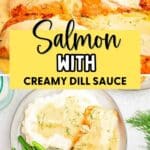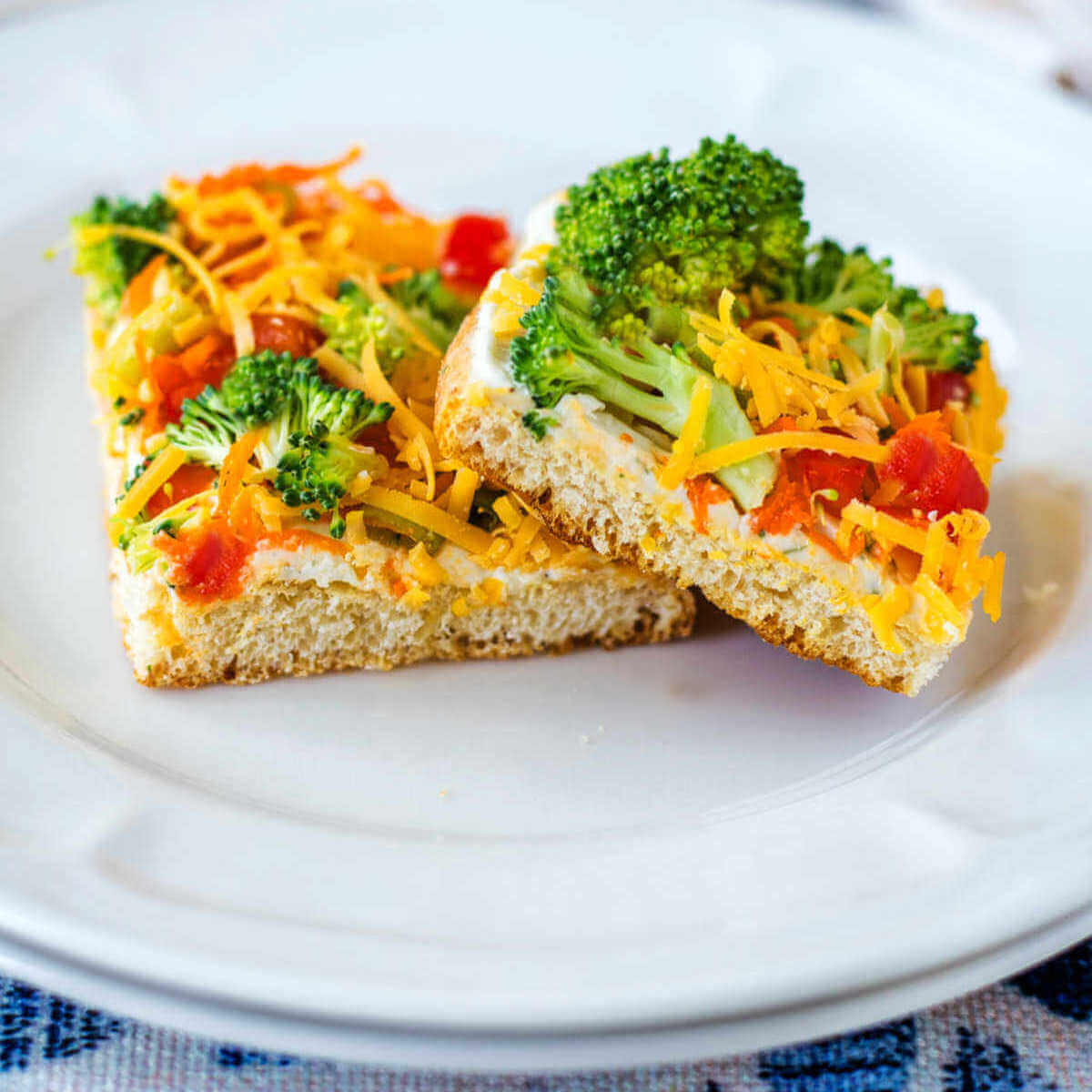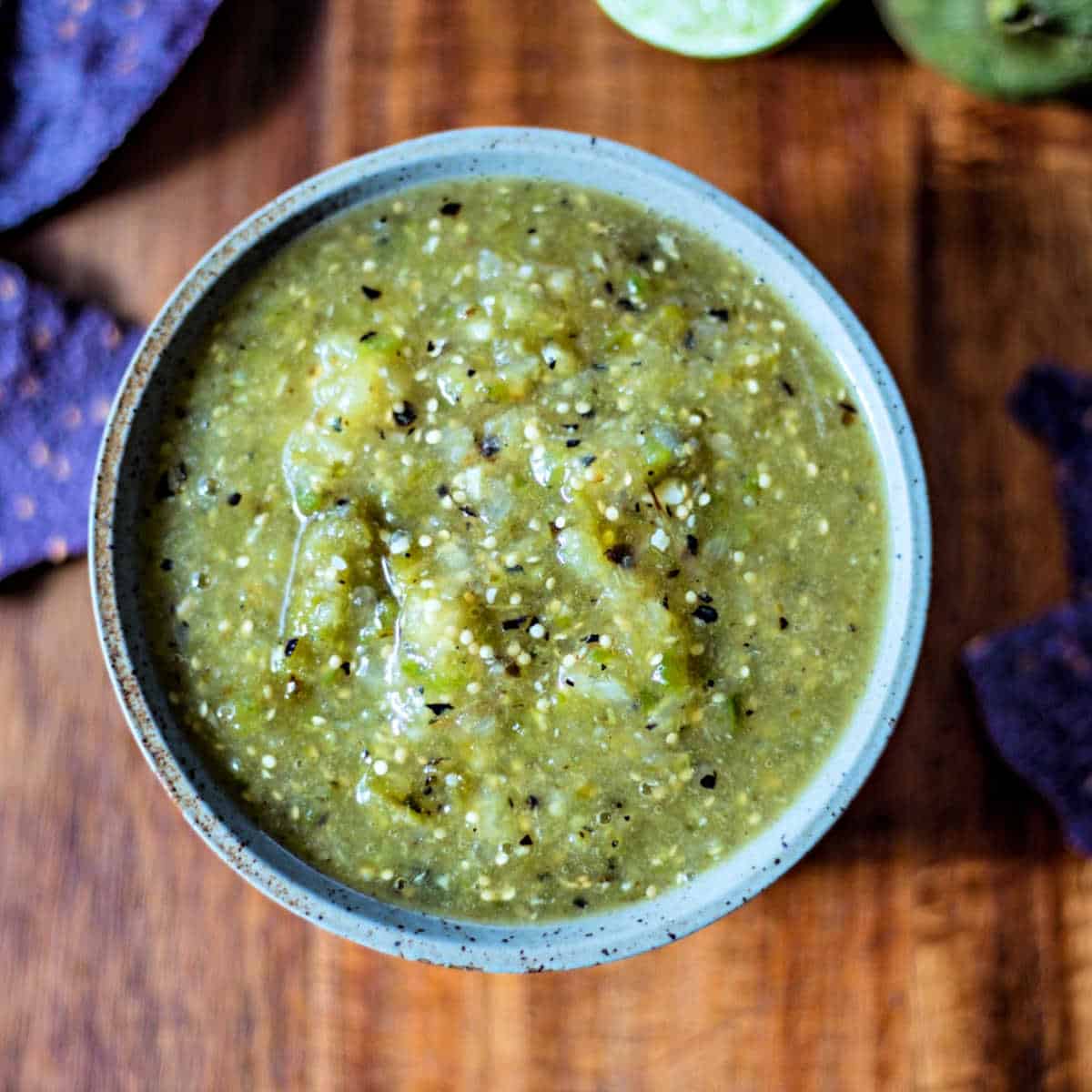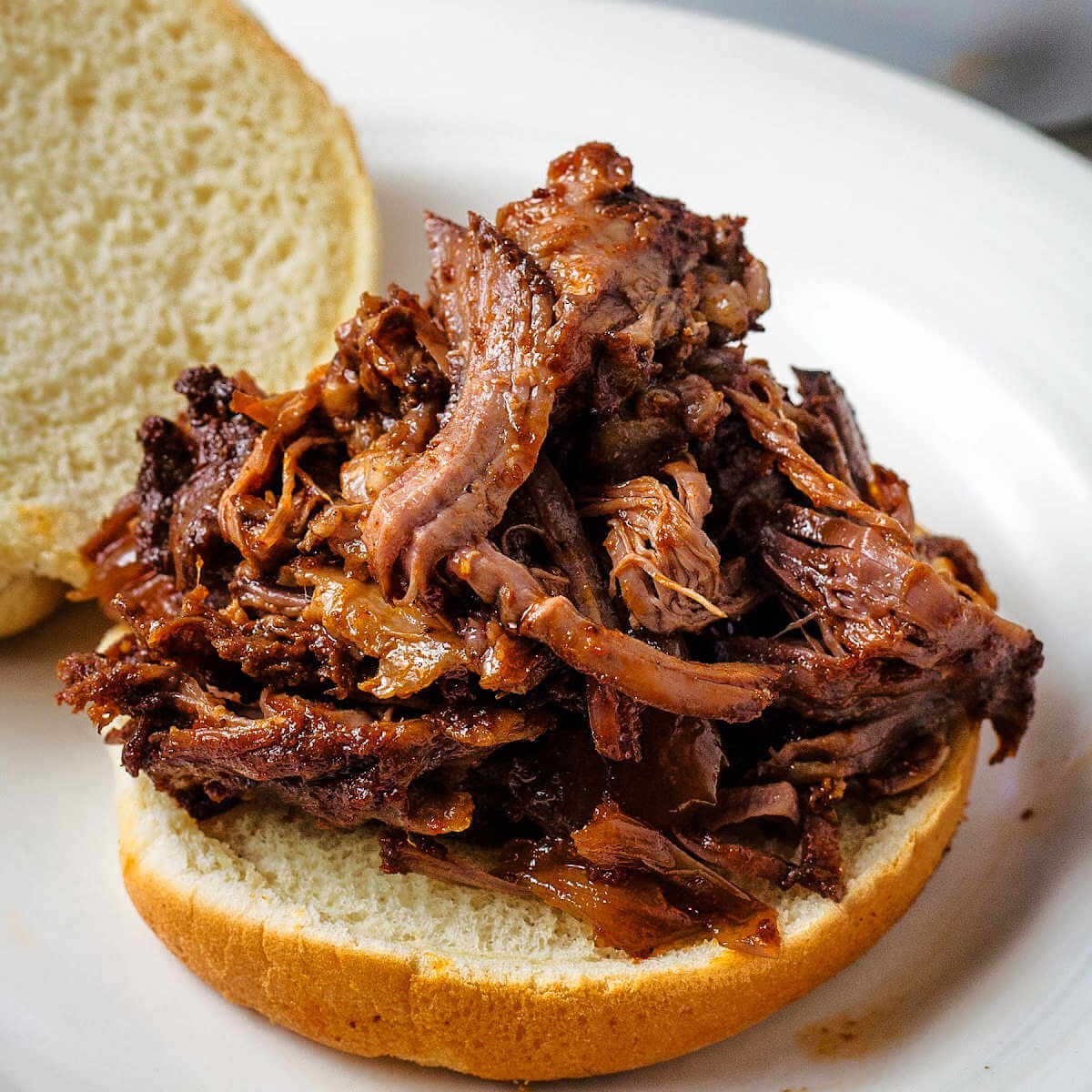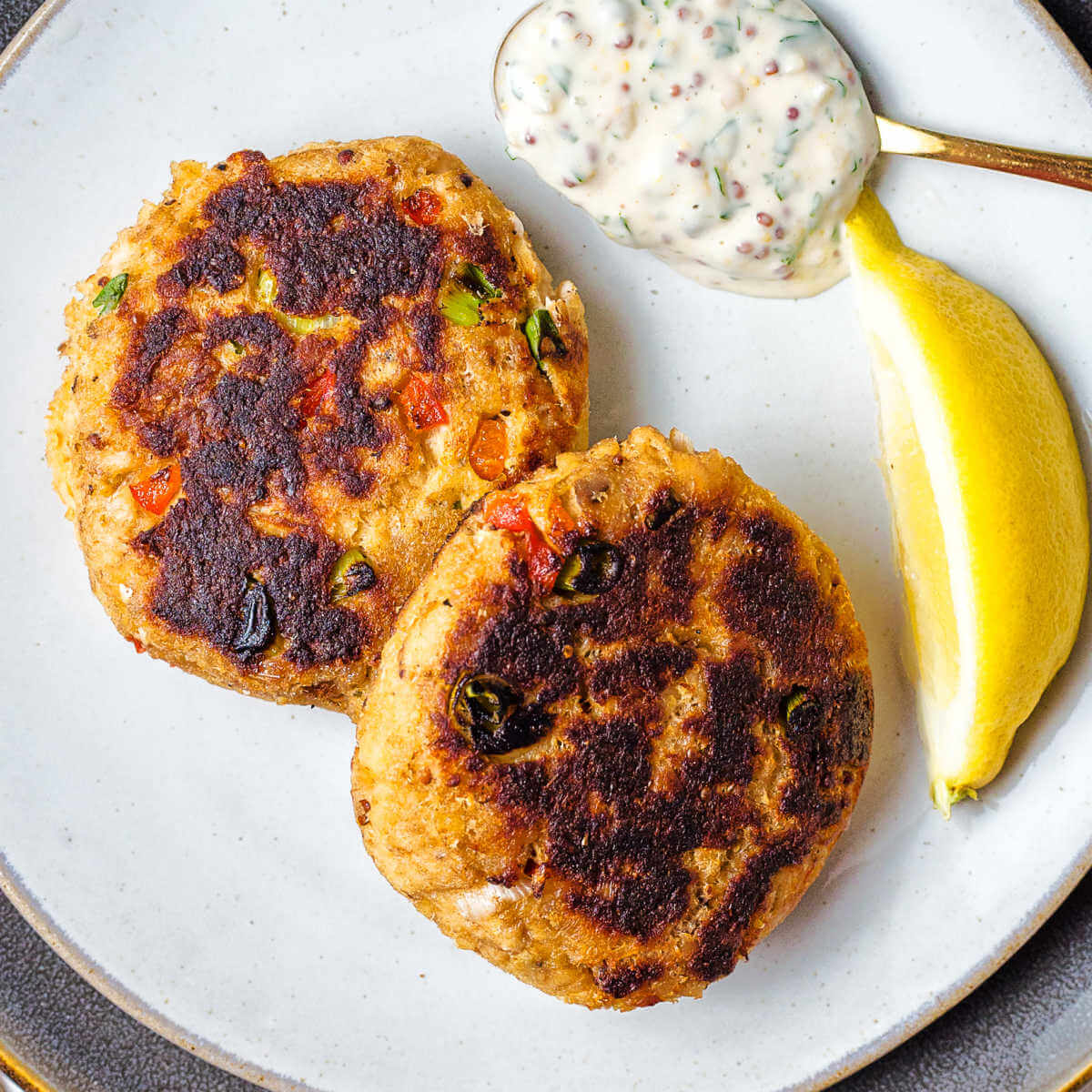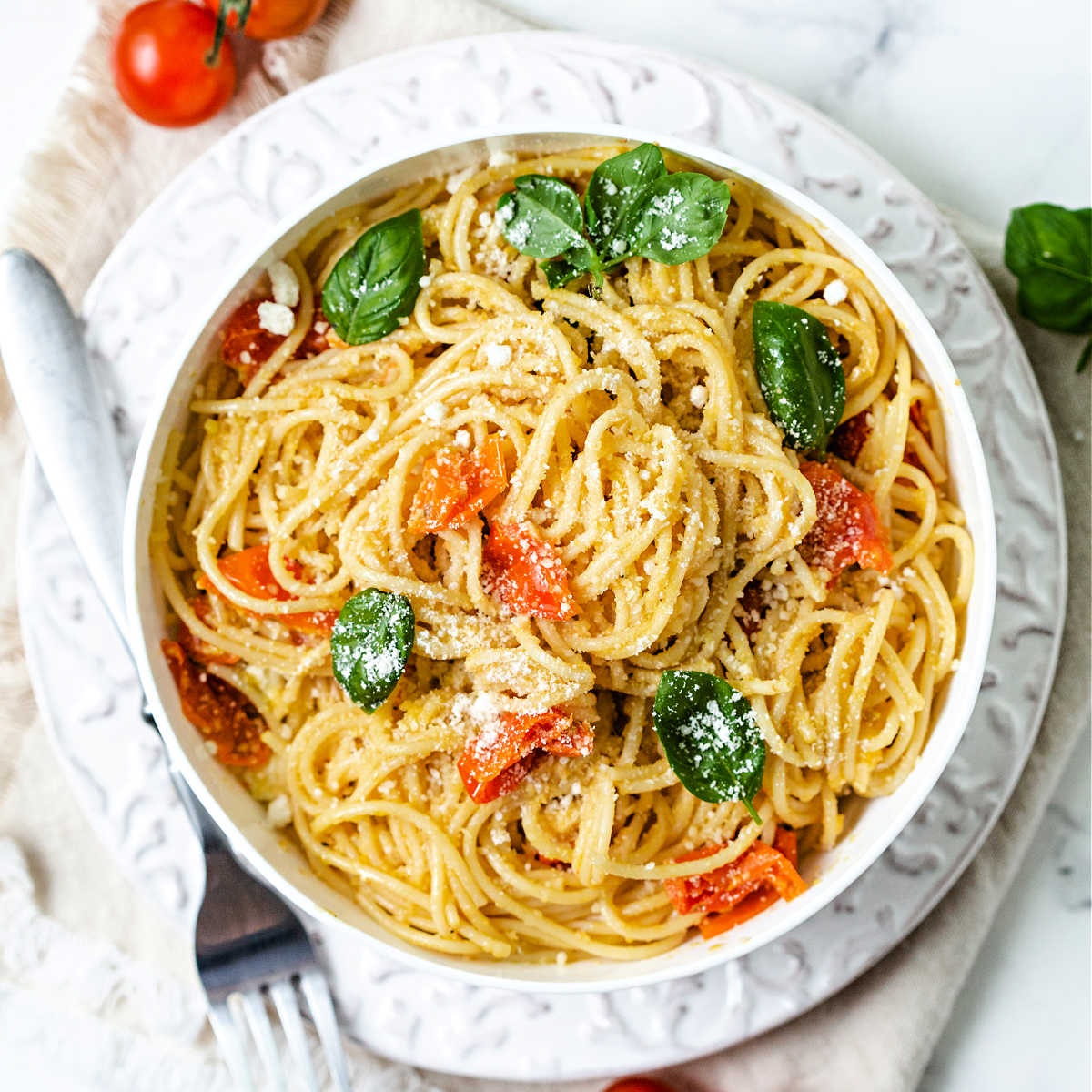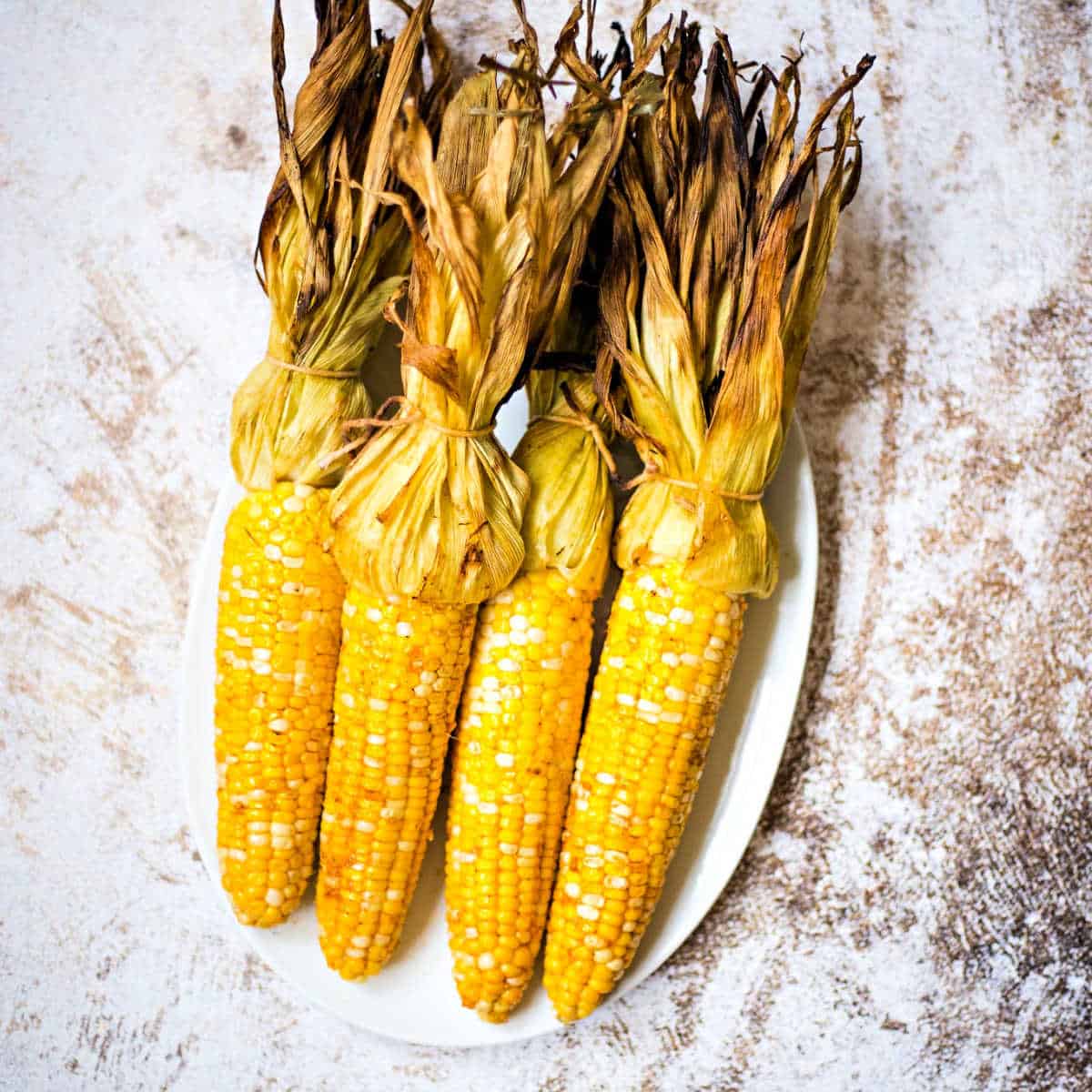Pan Seared Salmon with Creamy Dill Sauce
This post may contain affiliate links. Please read my disclosure policy.
This quick Pan-Seared Salmon with Dill Sauce is delicious, made with fresh dill, and thrown together with minimal dishes, time, and effort. Enjoy the best salmon of your life with this classic combination of a creamy dill sauce and a perfectly seasoned salmon filet.
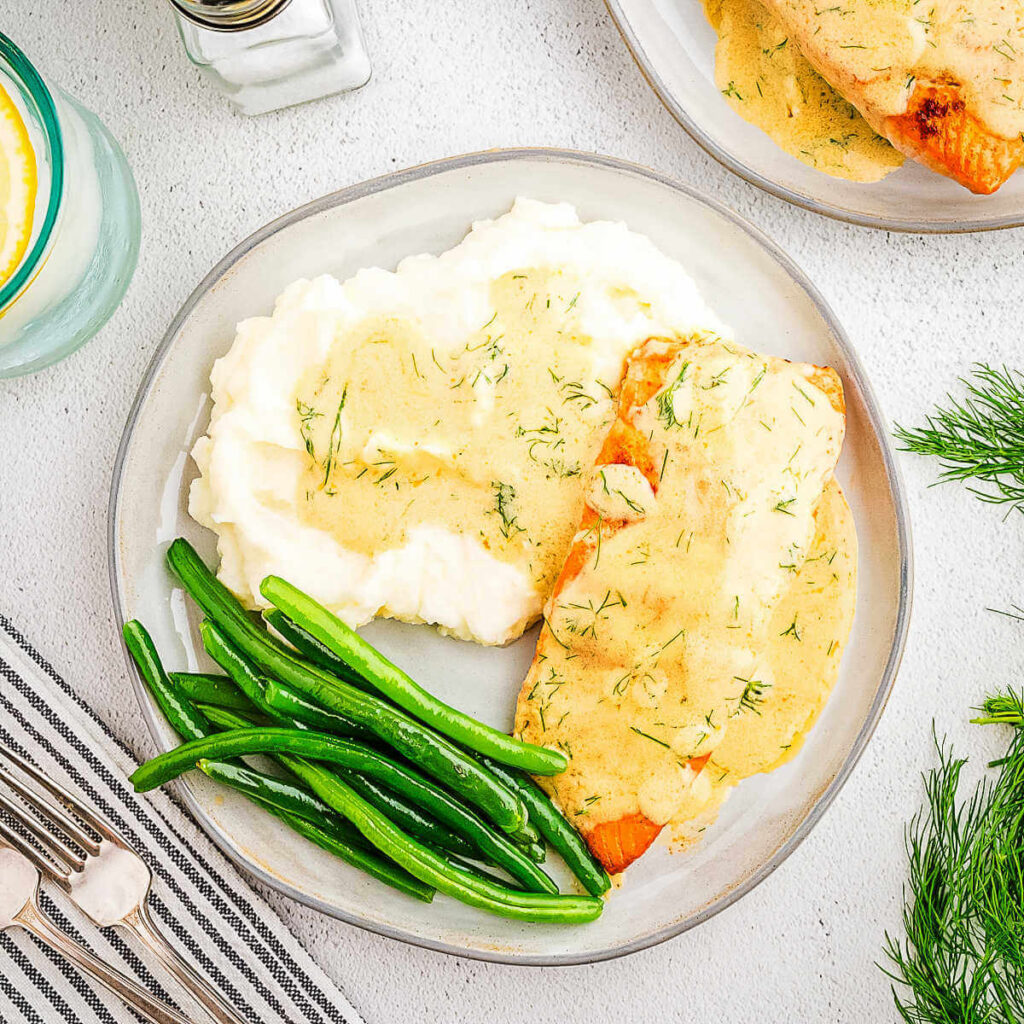

Why You’ll Love This Salmon With Dill Sauce Recipe!
If you’re craving more recipes where fresh herbs are the star of the show, check out this Avocado Corn Salad with basil dressing, my Dill Potato Salad, and Roasted Garlic Potato Soup.
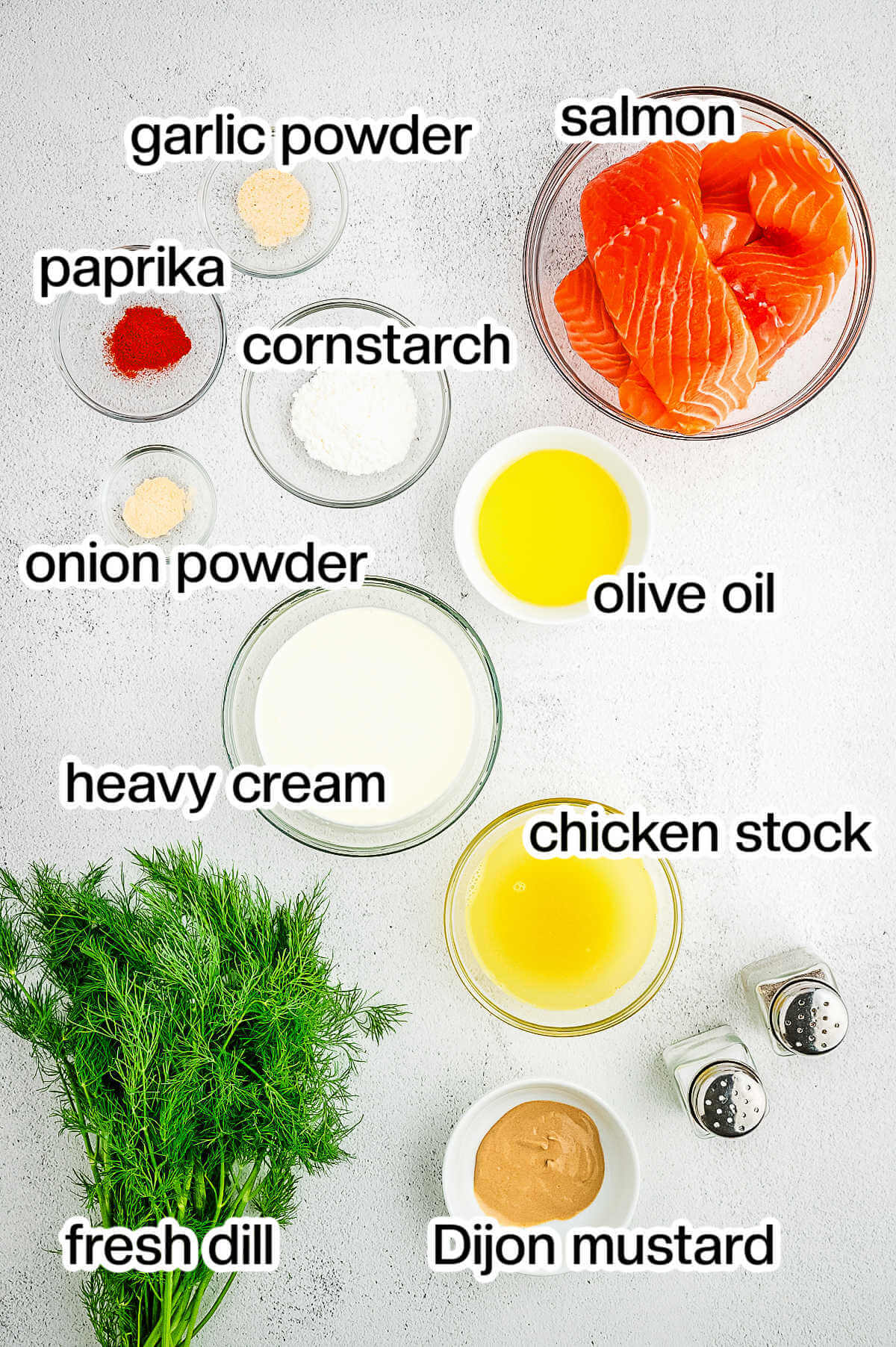
Ingredient Notes
- Salmon | I used four small filets with the skin off for this recipe. If you have skin-on salmon, you can pan-fry the salmon with the skin on. After the salmon is cooked, it should be easy to peel the skin off.
- Seasoning | Season the fish with kosher salt plus more to taste. Also, add garlic powder, onion powder, paprika, and freshly ground black pepper.
- Oil | For the best flavor, I like to use extra-virgin olive oil. However, other mild-tasting oils work well for pan-frying salmon.
- Stock | Use chicken stock to make the sauce savory.
- Mustard | Dijon mustard brings a tangy and subtly spicy taste to the dill sauce.
- Cream | Use heavy cream to make a rich and creamy sauce.
- Cornstarch | Thicken the dill sauce with cornstarch.
- Dill | The star of the show is chopped fresh dill weed, the thin green leafy part of the plant, not the dill seeds.
How to Make Salmon with Creamy Dill Sauce
This easy salmon recipe is a great weeknight dinner without compromising the flavor or nutritional value!
STEP 1 | Prep and season filets
Get started by prepping the salmon. Pat the salmon filets dry with a paper towel and season the top of the salmon filets with kosher salt, garlic powder, onion powder, and paprika.
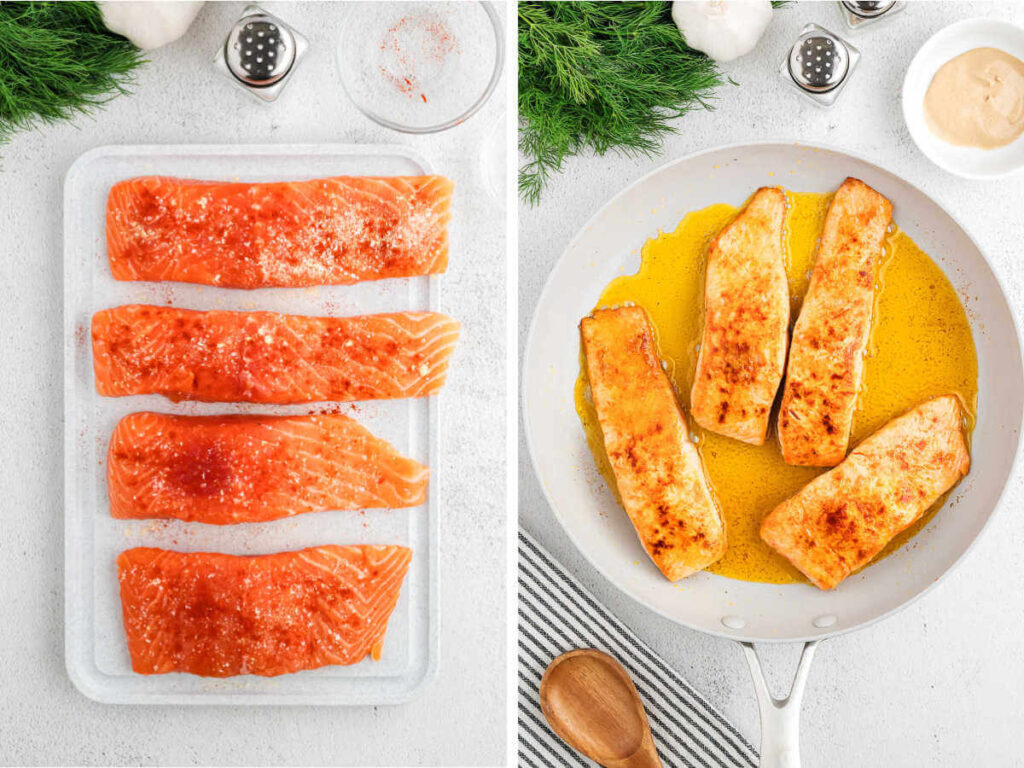
STEP 2 | Cook salmon
Next, heat a tablespoon of olive oil or two in a large skillet over medium-high heat, place the salmon in the pan seasoned side down, and cook it until it has a nice golden-brown crust, about 3 to 4 minutes. Flip the salmon and cook another 3-4 minutes on the second side,
The suggested cooking time varies because of the size of the fillet. It’s best to check the doneness of the fish with a meat thermometer. Once the internal temperature reaches 145 degrees F, remove the salmon from the pan and set it aside.
STEP 3 | Add stock and mustard
Then, add the chicken stock to the pan and stir for a couple of minutes, scraping any browned bits off the bottom of the pan. Add the Dijon mustard, stir well to combine, and turn the heat down to medium-low.
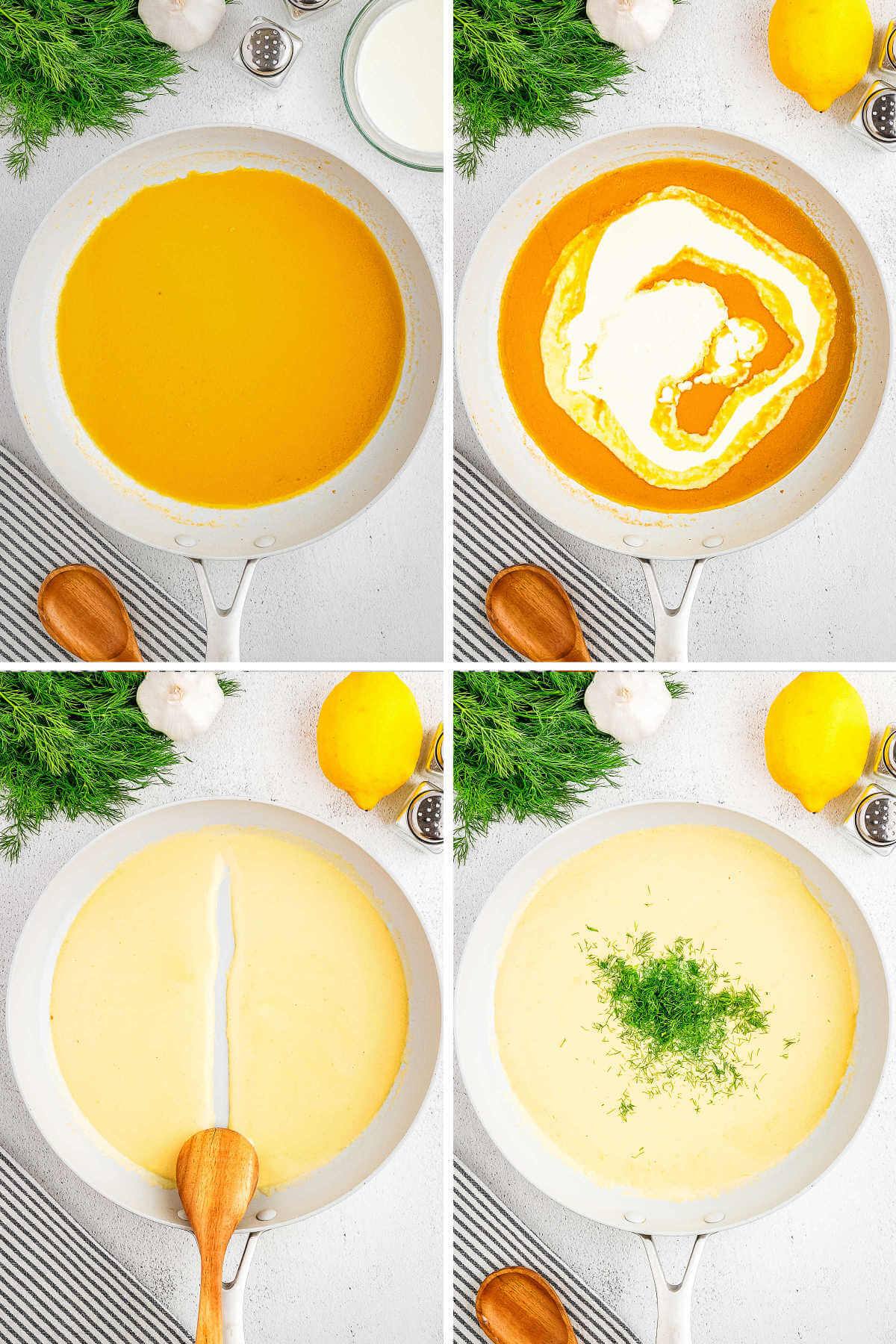
STEP 4 | Make the sauce base
Now, in a separate bowl, whisk together the cornstarch and heavy cream until no lumps remain. Slowly pour the cornstarch slurry into the pan, allowing the sauce to reach a low simmer while stirring for 2 to 3 minutes until the sauce is thick and creamy.
STEP 5 | Add dill, pour sauce, and enjoy!
Finally, add the chopped dill to the sauce and season with kosher salt and pepper to taste. I added ¼ teaspoon of additional kosher salt to the sauce at this step. Spoon the sauce over the salmon and enjoy fresh from the stove!
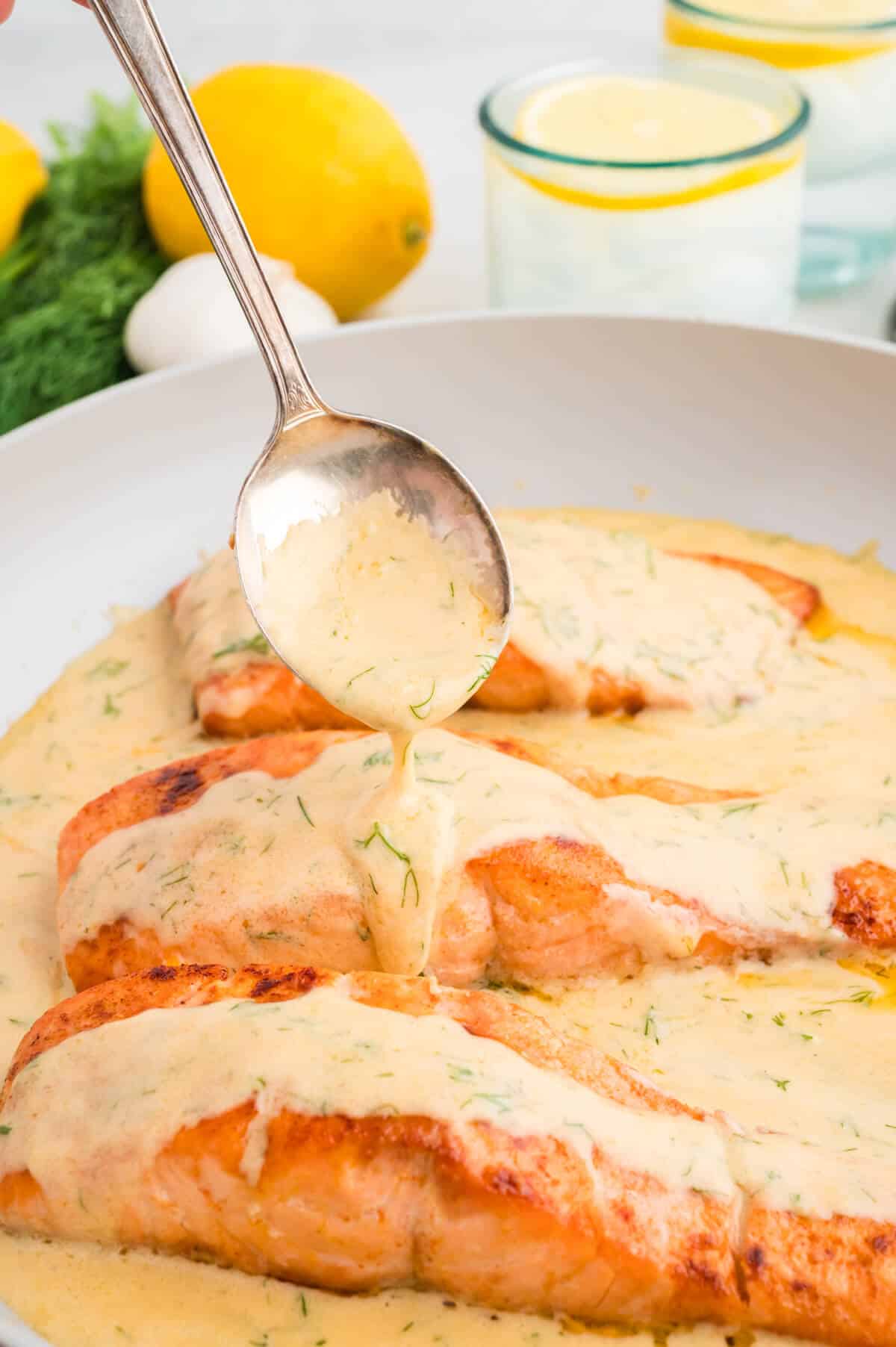

Tips from the Home Chef’s Kitchen
Variations and Substitutions
- Lemon Dill Sauce. Add lemon pepper to the salmon or squeeze fresh lemon juice into the sauce for a bright citrus flavor that always compliments fish so well.
- If necessary, swap the chicken stock with chicken broth.
- If you must, swap the fresh drill with dried dill you can. Just use a little less dried herb because it is strong in taste.
- Try my easy Salmon Dry Rub seasoning for a different flavor profile
Storage and Reheating Tips
- This recipe is best eaten right away, so I wouldn’t plan for leftovers. Salmon can get overcooked easily when reheated in the microwave.
- That said, if you happen to have leftovers, don’t throw them out. Store them in an airtight container in the refrigerator for 1 to 2 days. When ready to reheat them, do it in short bursts on medium power in the microwave until the fish is reheated.
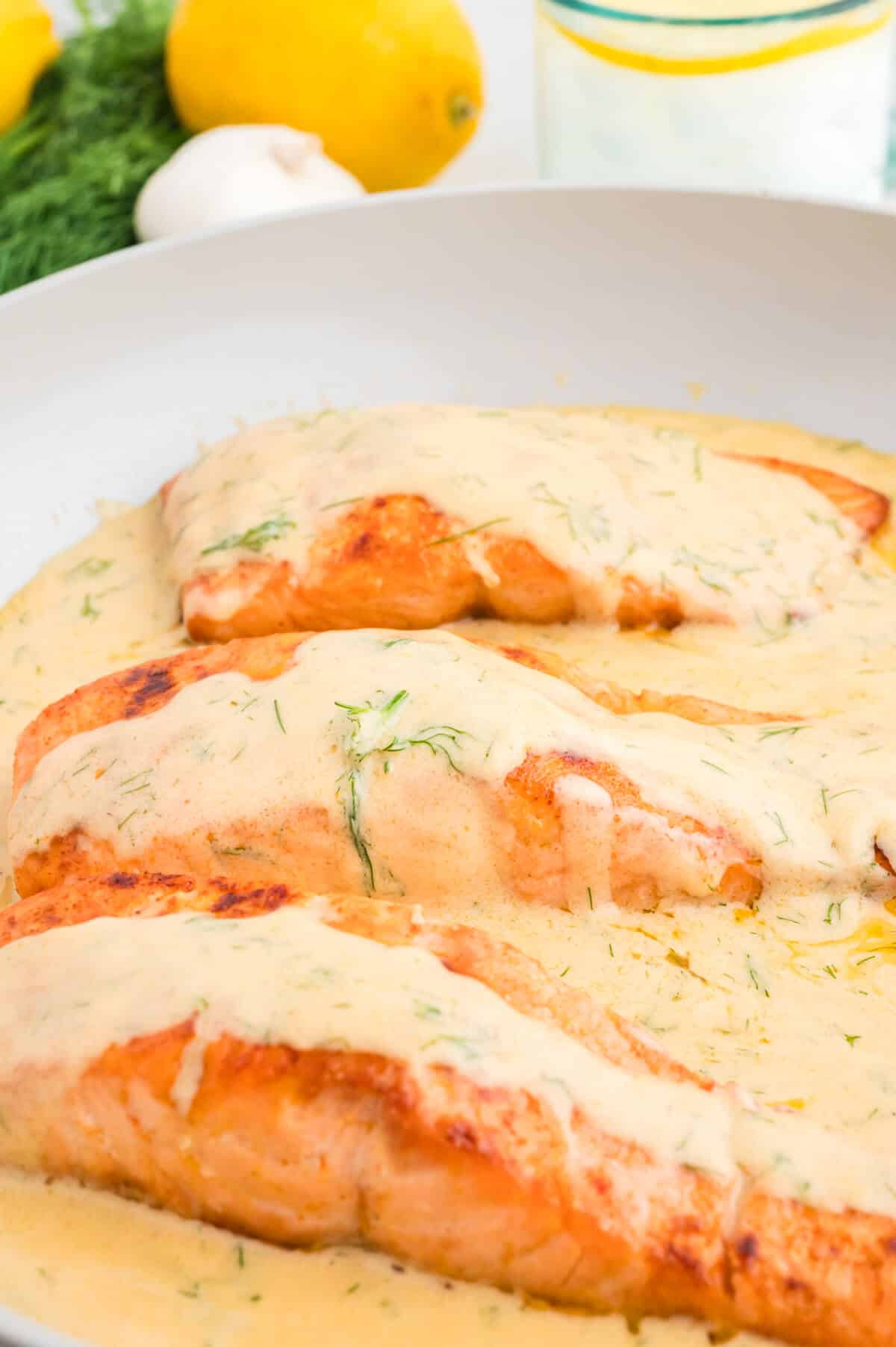
Frequently Asked Questions
There are a few things you should know to properly cook salmon. First, use the right pan. A quality, non-stick pan is best because salmon is delicate and easily sticks to a hot surface. Also, watch the fish closely as it cooks. It can quickly go from perfectly cooked to overdone. And finally, salmon leftovers will never be as delicious as the freshly pan-seared dish. It dries out and overcooks in the microwave or when reheated using other methods.
The white that comes from the salmon fillet as it cooks is called albumin. It is a flavorless protein that’s safe to consume but usually occurs when the salmon is overcooked.
One of the biggest frustrations when cooking salmon at home is how easily it sticks to the pan. To avoid this common mishap, use a quality, non-stick pan, and do not cook it too hot.
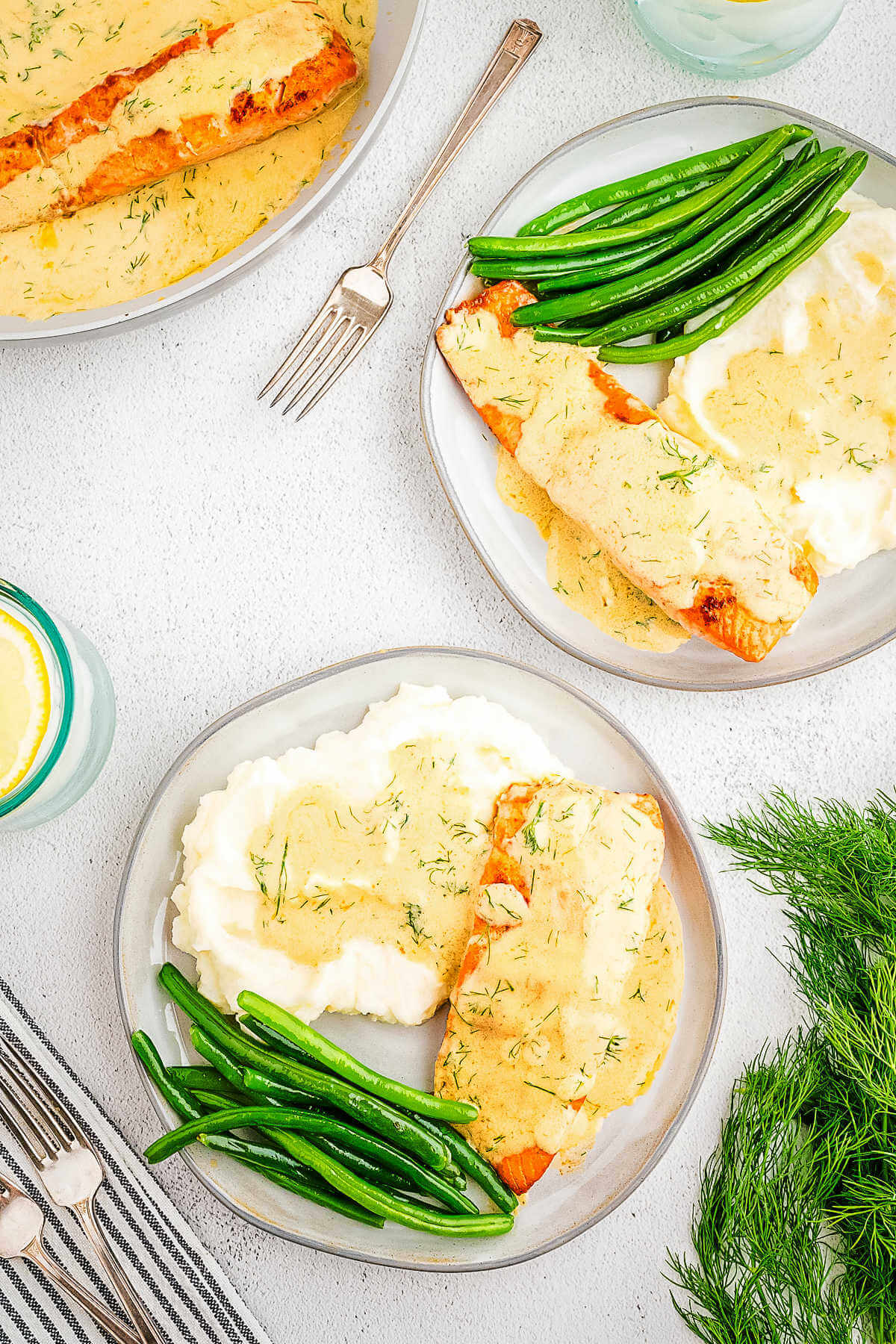

Looking for more Favorite Salmon Recipes?
There’s no shortage of salmon recipes here! While a classic Grilled Salmon in Foil is always delicious, it can be fun to play with flavors and make new combinations. For a little something different, try my Salmon Rice Bowl, Salmon and Salad (Bravo copycat recipe), Sheet Pan Salmon and Veggies, or this Mediterranean Salmon.
What to Serve with Salmon with Creamy Dill Sauce
One of my favorite meals is perfectly seasoned salmon with yummy green beans, like this Green Beans with Mushrooms, easy Instant Pot Green Beans with Bacon, or savory and delicious bacon-wrapped Green Bean Bundles. Sometimes, that’s all you need!
However, you can also serve the salmon and green beans with a side of freshly steamed rice, like my Instant Pot Jasmine Rice recipe.
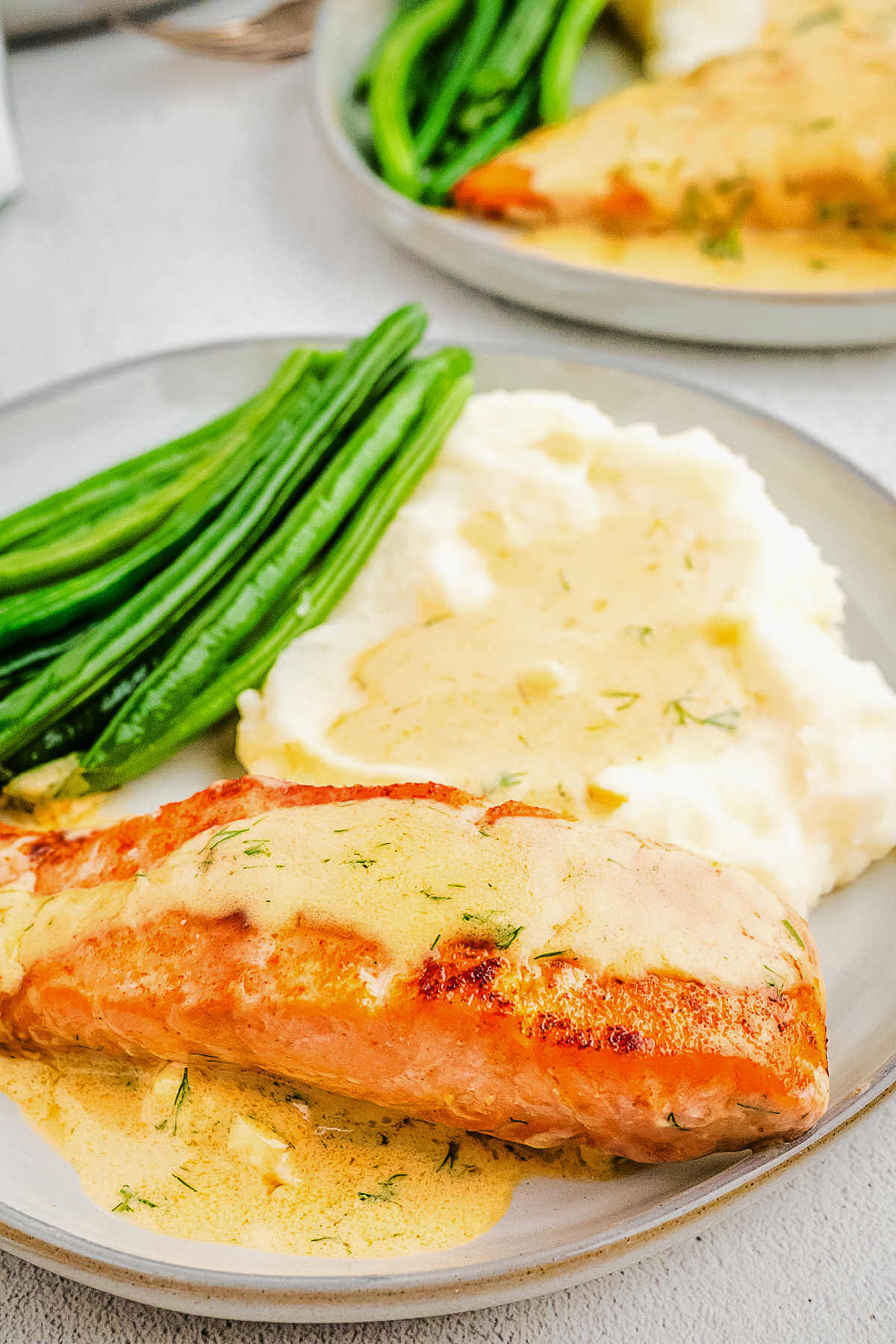

Love this recipe? Bookmark it for the future!
Simply tap the heart symbol located in the lower right corner of your screen, and the recipe will be securely stored in your own recipe box.
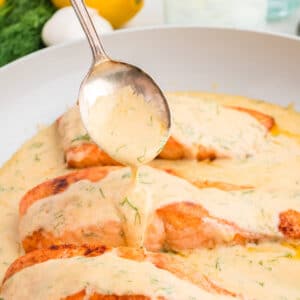
Pan Seared Salmon with Creamy Dill Sauce
Ingredients
- 1 ½ lbs. salmon filets, skin off 4 small filets
- ½ teaspoon kosher salt plus more to taste
- ¼ teaspoon garlic powder
- ¼ teaspoon onion powder
- ¼ teaspoon paprika
- 2 tablespoons extra-virgin olive oil
- ½ cup chicken stock
- 1 tablespoon Dijon mustard
- ½ cup heavy cream
- 1 tablespoon cornstarch
- 2 tablesooons chopped fresh dill
- fresh ground black pepper
Instructions
- Pat the salmon filets dry with a paper towel. Season the top of the salmon filets with kosher salt, garlic powder, onion powder, and paprika.
- Heat olive oil in a large skillet over medium-high heat. Place the salmon in the pan seasoned side down and cook it until it has a nice golden-brown crust, about 3-4 minutes. Flip the salmon and cook another 3-4 minutes on the second side, until the internal temperature reaches 145 degrees F. Remove the salmon from the pan and set aside.
- Add the chicken stock to the pan and stir for 1-2 minutes, scraping any browned bits off the bottom of the pan. Add the Dijon mustard and stir well to combine. Turn the heat down to medium-low.
- In a separate bowl, whisk together the cornstarch and heavy cream until no lumps remain. Slowly pour the cornstarch slurry into the pan. Allow the sauce to reach a low simmer and stir for 2-3 minutes until the sauce is thick and creamy.
- Add the chopped dill to the sauce, and season with kosher salt and pepper to taste. (I added ¼ teaspoon of additional kosher salt to the sauce at this step). Spoon the sauce over the salmon and enjoy immediately!
Notes
- Fish is delicate and can break apart easily when cooked. For this reason, I like to use a nonstick skillet along with plenty of olive oil to keep it from sticking to the pan and breaking the filets.
- Make sure to turn the heat down before adding the heavy cream to the sauce, and stir it constantly once added for just a few minutes. The sauce is thick enough when you can trace a trail through it with a spoon.
- I purchase salmon filets with the skin off for this recipe. If you have skin-on salmon, you can pan fry the salmon with the skin on (Step 2). After the salmon is cooked, it should be easy to peel the skin off.
Nutrition
Life Love and Good Food does not claim to be a registered dietician or nutritionist. Nutritional information shared on this site is only an estimate. We recommend running the ingredients through an online nutritional calculator if you need to verify any information.


